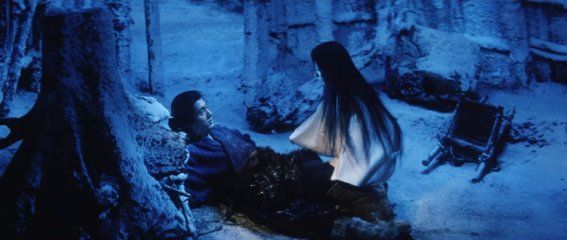Will the spirit come again tonight?

After Dead of Night, the closest contender for the title of best horror anthology is Masaki Kobayashi's Kwaidan, which was so well-regarded that it won the Special Jury Prize at Cannes and was nominated for Best Foreign Film at the Academy Awards. Made the same year as Kaneto Shindô's Onibaba, it's another film that's more about establishing a creepy atmosphere and building tension than sudden shocks, which greatly benefits all four of its individual stories.
First up is "The Black Hair," in which an impoverished samurai (Rentaro Mikuni) abandons his industrious first wife (Michiyo Aratama) to take post in a faraway province and marries into a rich family. He quickly regrets his decision, though, when his second wife (Misako Watanabe) turns out to be a horrible human being and returns home years later only to find it in ruins. To his surprise Aratama is unchanged, and when he begs her forgiveness she's very understanding about the whole thing, but their happy reunion is short-lived for reasons that soon become evident.
The second story (which was unaccountably excised when the film was first released in the States) is "The Woman of the Snow," which is about an apprentice woodcutter (Tatsuya Nakadai) who narrowly avoids freezing to death alongside his master when the title character (Keiko Kishi) takes pity and spares him. Her one condition is that he can't tell anyone what happened, which he's more than happy to go along with. One year later, having kept up his end of the bargain, he meets a stranger in the same forest (Kishi again) and brings her home to meet his mother, who must have approved of her because in no time flat they're married and have three children. Then one night he's reminded of the time he almost froze to death and tells her the story, not realizing until it's too late that some promises should never be broken.
Up third is "Hoichi the Earless," which is by far the longest (and arguably the most famous) segment in the whole film. It tells of a blind biwa player (Katsuo Nakamura) staying at a temple who begins receiving nightly visitations from a ghostly samurai (Tetsuro Tanba) who implores Nakamura to recite the story of the battle in which his clan was vanquished 700 years earlier. It's only after the priest of the temple (Takashi Shimura) has Nakamura followed that he finds out how much danger he's in and steps are taken to protect him. Alas, as the title of the story blatantly gives away, they're not as thorough as he probably would have liked.
Batting cleanup is the brief "In a Cup of Tea," a story that is without an ending because the original author never got around to finishing it. It starts with a samurai (Kanemon Nakamura) seeing the reflection of a stranger (Noboru Nakaya) in his cup when he goes to quench his thirst. This unnerves him, but he finally drinks it down, and while on guard duty that night he is revisited by Nakaya, who turns out to be as insubstantial as a spirit. And the same goes for his three retainers, who pay a call on the frazzled Nakamura the next night at home. That's where the story cuts off, though, and Kobayashi steadfastly refuses to tack one onto it, rightly acknowledging that nothing he could come up with would be arbitrary at best. That makes him that rare thing: a director who knows how to quit when he's ahead.